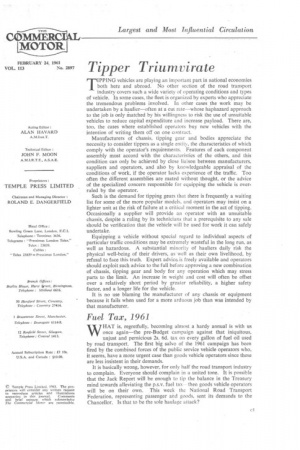Tipper Triumvirate
Page 47

If you've noticed an error in this article please click here to report it so we can fix it.
T1PPING vehicles are playing an important part in national economies both here and abroad. No other section of the road transport industry covers such a wide variety of operating conditions and types of vehicle. In some cases, the fleet is organized by experts who appreciate the tremendous problems involved. In other cases the work may be undertaken by a haulier—often at a cut rate whose haphazard approach to the job is only tn. atched by his willingness to risk the use of unsuitable vehicles to reduce capital expenditure and increase payload. There are, too, the cases where established operators buy new vehicles with the intention of writing them off an one contract.
Manufacturers of chassis, tipping gear and bodies appreciate the necessity to consider tippers as a single entity, the characteristics of which comply with the operator's requirements. Features of each component assembly must accord with the characteristics of the others, and this condition can only be achieved by close liaison between manufacturers, suppliers and operators, and also by knowledgeable appraisal of the conditions of work, if the operator lacks experience of the traffic. Too often the different assemblies are mated without thought, or the advice of the specialized concern responsible for equipping the vehicle is overruled by the operator.
Such is the demand for tipping gears that there is frequently a waiting list for some of the more popular models, and operators may insist on a lighter unit at the risk of failure at a critical moment in the act of tipping. Occasionally a supplier will provide an operator with an unsuitable chassis, despite a ruling by its technicians that a prerequisite to any sale should be verification that the vehicle will be used for work it can safely undertake.
Equipping a vehicle without special regard to individual aspects of particular traffic conditions may be extremely wasteful in the long run, as well as hazardous. A substantial minority of hauliers daily risk the physical well-being of their drivers, as 'well as their own livelihood, by refusal to face this truth. Expert advice, is freely available and operators should exploit such advice to the full before approving a new combination of chassis, tipping gear and body for any operation which may stress parts to the limit. An increase in weight and cost will often be offset over a relatively short period by greater reliability, a higher safety factor, and a longer life for the vehicle.
It is no use blaming the manufacturer of any chassis or equipment because it fails when used for a more arduous job than was intended by that manufacturer.
Fuel Tax, 1961
WHAT is, regretfully, becoming almost a hardy annual is with us once again—the pre-Budget campaign against that iniquitous, unjust and pernicious 2s. 6d. tax on every gallon of fuel oil used by road transport. The first big salvo of the 1961 campaign has been fired by the combined forces of the public service vehicle operators who, it seems, have a more urgent case than goads vehicle operators since these are less insistent in their demands.
It is basically wrong, however, for only half the road transport industry to complain. Everyone should complain in a united tone. It is possible that the Jack Report will be enough to tip the balance in the Treasury mind towards alleviating the p.s.v. fuel tax --then goods vehicle operators will be on their own. This week the National Road Transport Federation, representing passenger and goods, sent its demands to the Chancellor. Is that to be the sole haulage attack?




































































































































































